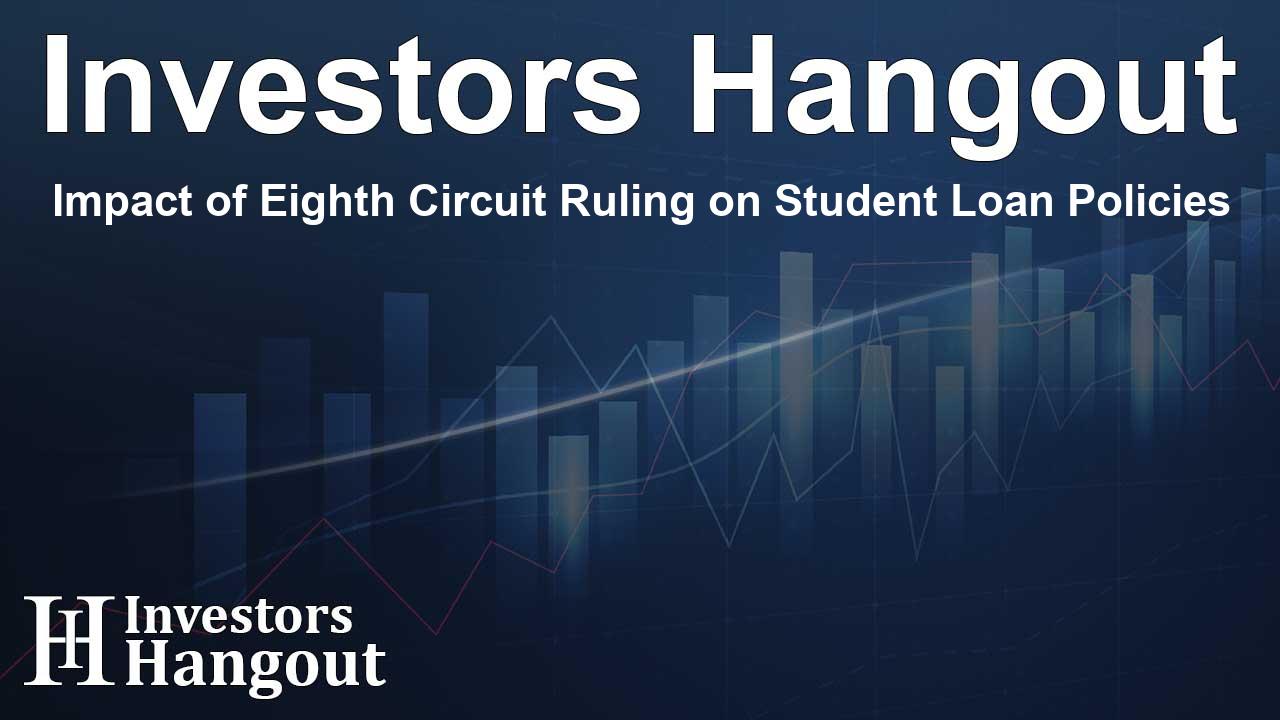Impact of Eighth Circuit Ruling on Student Loan Policies

The Eighth Circuit's Pivotal Decision on Student Loans
The U.S. Court of Appeals for the Eighth Circuit recently upheld a significant ruling that opposes the Biden administration's controversial student loan debt cancellation strategies. This landmark decision expanded upon a preliminary injunction aimed at stopping the Department of Education's "SAVE" plan, an initiative that the New Civil Liberties Alliance (NCLA) has vocally opposed for years.
Understanding the SAVE Plan
The so-called SAVE plan sought to modify existing loan repayment frameworks established by the 1993 amendments to the Higher Education Act (HEA). The Eighth Circuit's rejection of this plan underscores the importance of legislative authority in shaping student loan policies. Legal experts viewed this as a necessary check on executive power, which overstepped congressional intent by conflating repayment with loan cancellation.
The NCLA's Advocacy
NCLA has been actively involved in challenging the SAVE plan since its inception. They highlighted that the original 1993 laws do not encompass any provisions for outright loan cancellation but establish a framework for income-based repayment. Their consistent efforts have culminated in this judicial victory, which reinforces the need for adherence to legislative guidelines when addressing student loan laws.
Judicial Insights on Legislative Intent
The Eighth Circuit's judges, particularly Judge L. Steven Grasz, emphasized that accepting the Department's interpretation of the law would set a dangerous precedent. He illustrated that allowing endless cancellations disguised as repayment could lead to absurd outcomes, where borrowers might pay negligible amounts while their debts evaporate. This commentary reflects the core of NCLA's arguments against the SAVE initiative.
Consequences for Borrowers and Taxpayers
The implications of this ruling extend beyond legal terminology; they resonate with millions of borrowers currently navigating the complexities of student loans. With potential savings of $475 billion for taxpayers that this ruling promises, the Eighth Circuit's decision is not only a legal victory but also a fiscal one. Taxpayers now have a reprieve from the burden of covering significant loan cancellations that had questionable legal footing.
Legislative Backup and Future Prospects
Historically, Congress has enacted specific programs like the Public Service Loan Forgiveness (PSLF), which offers targeted relief under strict conditions. The Eighth Circuit's ruling clarifies that programs must work within the established framework and that any changes or proposals must be carefully evaluated to avoid undermining existing laws. The likelihood of legislative overhaul remains uncertain, but the recent court ruling has certainly curtailed any attempts to unilaterally effect broad student loan forgiveness.
Statements from NCLA Leadership
The leadership of NCLA has expressed satisfaction with the court's ruling. Sheng Li, a litigation counsel at NCLA, commented that the situation leaves millions of borrowers in limbo while placing the blame on agency officials who neglected warnings about the proposed SAVE plan's legality.
Similarly, Mark Chenoweth, the president of NCLA, critiqued the intention behind the SAVE program, implying that it was fatally flawed from the start. The commentary reinforces a belief among legal experts that courts must serve as a counterbalance to executive decisions that may otherwise lack proper authorization.
About the New Civil Liberties Alliance
NCLA stands at the forefront of protecting constitutional freedoms against unauthorized governmental actions. Founded by legal scholar Philip Hamburger, NCLA’s mission emphasizes the necessity of advocating for civil rights in an increasingly complex administrative landscape. Their pro bono efforts epitomize a commitment to ensuring that the historical underpinnings of American law guide contemporary policy debates.
Frequently Asked Questions
What is the SAVE plan?
The SAVE plan was an initiative proposed by the Department of Education to modify student loan repayment structures, controversially interpreted as allowing for loan cancellations.
Why did the Eighth Circuit rule against the SAVE plan?
The court determined that the Department of Education exceeded its authority by interpreting the 1993 HEA amendments to include loan cancellation, which was not authorized.
What implications does this ruling have for borrowers?
This ruling could prevent taxpayers from bearing the costs of massive loan cancellations, helping to maintain the integrity of established student loan programs.
How has NCLA been involved in this case?
NCLA has actively challenged the SAVE plan, providing legal arguments against its implementation and advocating for compliance with established student loan laws.
What does this decision mean for future student loan policies?
The ruling reinforces the necessity for legislative authority in student loan policy-making, potentially influencing how future programs are designed and implemented.
About The Author
Contact Henry Turner privately here. Or send an email with ATTN: Henry Turner as the subject to contact@investorshangout.com.
About Investors Hangout
Investors Hangout is a leading online stock forum for financial discussion and learning, offering a wide range of free tools and resources. It draws in traders of all levels, who exchange market knowledge, investigate trading tactics, and keep an eye on industry developments in real time. Featuring financial articles, stock message boards, quotes, charts, company profiles, and live news updates. Through cooperative learning and a wealth of informational resources, it helps users from novices creating their first portfolios to experts honing their techniques. Join Investors Hangout today: https://investorshangout.com/
The content of this article is based on factual, publicly available information and does not represent legal, financial, or investment advice. Investors Hangout does not offer financial advice, and the author is not a licensed financial advisor. Consult a qualified advisor before making any financial or investment decisions based on this article. This article should not be considered advice to purchase, sell, or hold any securities or other investments. If any of the material provided here is inaccurate, please contact us for corrections.
